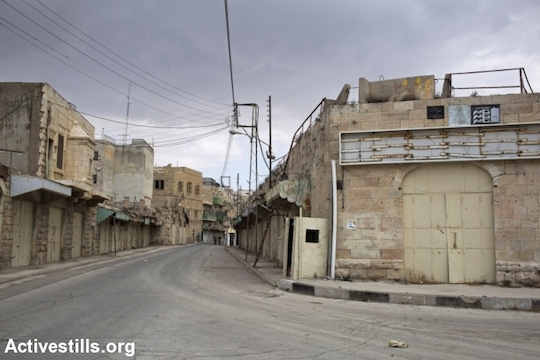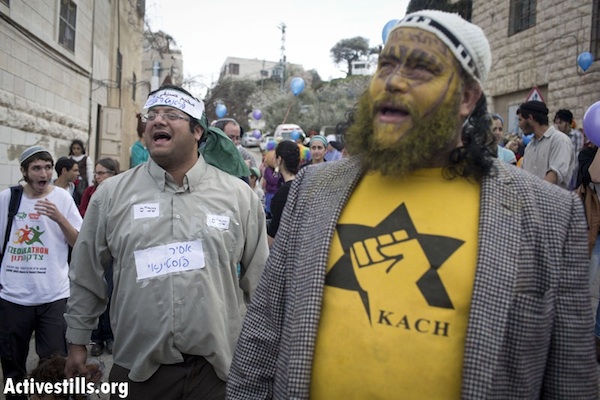Twenty-one years have passed since Baruch Goldstein entered Hebron’s Cave of the Patriarchs and massacred dozens of Muslim worshippers. Since then, Palestinians in the city have been placed under a harsh regime of separation and movement restriction. Some of us can’t even leave our own homes.
By Zleikha Muhtaseb

Imagine that you are in your home, sitting on your comfortable couch, making a cup of tea or perhaps looking at the view through your window. You are safe and calm — here no one can hurt you. Now imagine that the front door of your home has been locked by a foreign army that forbids you from walking on the main street where your house is located. Imagine that in order to leave your house you are forced to break through another part of your house so as to create an alternative exit. Imagine that your balcony is closed off by a fence that you built in order to protect yourself from rocks thrown at your house by your neighbors. Imagine that at any given moment, soldiers can burst into your home and act as they want.
This is more than just a thought experiment — this is what my life looks like, living on Shuhada Street in Hebron. As a result of an order given by the Israeli military, my front door, which faces the street, has been locked. The neighbors who throw rocks at my fenced-off balcony are settlers, Israeli citizens who slowly took over buildings and homes in the area over the past decades. The soldiers who can enter my home at will are Israeli soldiers who patrol the street at all hours of the day and night. But if I ask them for help when rocks are thrown at my home, they will never respond.
Visitors who have never been here might have a hard time imagining what Shuhada Street looked like years ago, when it was full of life and shops — the commercial center of the city. Today only soldiers and settlers are allowed to walk down the streets, while the shops are closed and their doors locked. Almost 80 percent of the stores in this part of the city were shut down in the last 20 years, many times due to military orders in the name of “security.”
According to some estimates, nearly half the residents of the area have left. And who can blame them? Who wouldn’t consider leaving their home after it becomes a jail, after their source of income disappears, where fear and violence reign on every corner, when even the simplest act of normalcy — a visit to a cemetery or calling an ambulance — becomes a complicated operation due to restrictions on movement?
This week we mark 21 years since the Cave of the Patriarchs Massacre, in which a resident of the nearby settlement Kiryat Arba murdered 29 Muslim worshippers, and wounded over 100 more. I will not forget that day or how people lost their lives. But this day changed Hebron not only because of the pain, anger and fear that we felt. By the 1990s, the presence of settlers and soldiers in Hebron was nothing new, but in the wake of the massacre, Israel added insult to injury and began restricting Palestinian movement in the city, specifically in areas near settlements. Those same restrictions were only increased in 2000 with the beginning of the Second Intifada. Along with the never-ending presence of the soldiers and the violence of the settlers, they turn life here into a constant struggle.
Apartheid in our city
The spread of the settlements in Hebron slowly affects more and more of the city’s residents. In 2014, settlers took over the Rajbi building, the first Jewish settlement in the city since the 1980s. Every new settlement makes the lives of the locals a living hell.

Israel says its policies in Hebron are based on “security.” However the truth must be said out loud: these are not “security-based” policies, but rather policies of apartheid. There is no better term for a policy that grants privileges and legal immunity to the Jewish minority with Israeli citizenship, living in the heart of a Palestinian city. There is no better term for a policy based on the logic of physical separation, which uses the presence of several hundred settlers living in Hebron as an excuse to shut down entire streets to Palestinians.
When people ask me, “how can you continue living like a prisoner in your home?” my answer is simple: I live here because it is my home, my street and my city. The settlers want us to leave, but we will remain and fight for our right to live freely in our home.
This week, activists in Hebron, along with supporters in Israel and across the world, will call on Israel to open Shuhada Street. This call is part of a larger movement that demands the evacuation the settlements from our city, as well as an end to military control, restrictions and apartheid. Only then will we be able to rehabilitate our city and our communities, which have been and continue to be destroyed by the regime. We hope for a future in which we can live peacefully in our homes and walk safely on our streets. We hope that anyone who believes in justice, equality and peace joins our call.
Zleikha Muhtaseb is a resident of Shuhada Street in Hebron, a kindergarten teacher and an activist in the Youth Against Settlements organization. This article was first published on +972′s Hebrew-language sister site, Local Call. Read it in Hebrew here.
